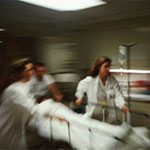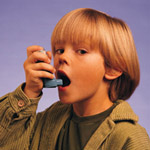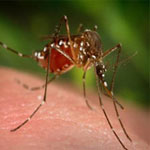Health
Heat waves, severe storms, air pollution, and diseases linked to climate already threaten people's health in many areas of the world. Global climate change will increase these threats. Some people will be particularly at risk, especially those who are poor, very young or elderly, or disabled, or those who live in coastal areas or big cities.
What's at stake?
Temperature–Related Illnesses
 Heat waves are uncomfortable for everyone, but for infants and young children, the elderly, and people who are already sick, they can be especially dangerous. Extreme heat can cause illnesses such as heat cramps, heat stroke, and even death. A 2003 heat wave in Europe caused about 50,000 deaths, and a 1995 heat wave in Chicago caused more than 600 deaths. In fact, heat waves cause more deaths in the United States every year than hurricanes, tornadoes, floods, and earthquakes combined.
Heat waves are uncomfortable for everyone, but for infants and young children, the elderly, and people who are already sick, they can be especially dangerous. Extreme heat can cause illnesses such as heat cramps, heat stroke, and even death. A 2003 heat wave in Europe caused about 50,000 deaths, and a 1995 heat wave in Chicago caused more than 600 deaths. In fact, heat waves cause more deaths in the United States every year than hurricanes, tornadoes, floods, and earthquakes combined.
On the flip side, as the world gets warmer, the number of illnesses and deaths related to extreme cold (like hypothermia and frostbite) may decrease.
- What can people do about it?
People should take precautions on hot days to keep cool. Cities can also set up heat wave warning systems and air-conditioned shelters where people can cool off.
What's at stake?
Air Pollution
 You probably know someone with asthma, or maybe you have this condition yourself. Certain kinds of air pollutants, like ozone, can make asthma and other lung conditions worse. Ozone found high in the atmosphere is called "good ozone" because it protects life on Earth from the sun's harmful ultraviolet rays. Ozone can also be found close to the surface of the Earth, where it is considered “bad ozone” because it's the main ingredient of smog and is harmful for people to breathe. Bad ozone is created from pollutants that go through chemical reactions in the atmosphere. Climate change is likely to increase the amount of bad ozone in the air because more ozone is created when the temperature is warm. Learn more about ozone.
You probably know someone with asthma, or maybe you have this condition yourself. Certain kinds of air pollutants, like ozone, can make asthma and other lung conditions worse. Ozone found high in the atmosphere is called "good ozone" because it protects life on Earth from the sun's harmful ultraviolet rays. Ozone can also be found close to the surface of the Earth, where it is considered “bad ozone” because it's the main ingredient of smog and is harmful for people to breathe. Bad ozone is created from pollutants that go through chemical reactions in the atmosphere. Climate change is likely to increase the amount of bad ozone in the air because more ozone is created when the temperature is warm. Learn more about ozone.
- What can people do about it?
People can check the daily air quality forecast for their area by looking in the newspaper, on TV, or on weather websites. Air quality alerts can also be found at www.airnow.gov. When ozone levels are high, people should be careful about exercising or working outdoors.
What's at stake?
Spreading Diseases
 Climate change might allow some infectious diseases to spread. As winter temperatures increase, ticks and mosquitoes that carry diseases can survive longer throughout the year and expand their ranges, putting more people at risk. One big concern is malaria, a deadly disease spread by mosquitoes in many hot, humid parts of the world.
Climate change might allow some infectious diseases to spread. As winter temperatures increase, ticks and mosquitoes that carry diseases can survive longer throughout the year and expand their ranges, putting more people at risk. One big concern is malaria, a deadly disease spread by mosquitoes in many hot, humid parts of the world.
- What can people do about it?
People should take common-sense steps to avoid tick and mosquito bites, and communities can take actions to control mosquitoes, such as removing sources of standing water. It's also important for doctors to know the symptoms of diseases that could be spreading to new areas so they can diagnose and treat their patients.
Learn more
- Take an expedition to Southeast Asia to learn more about the effects of climate change on infectious diseases and people's health.
- Find out more about how people can prepare for threats to human health.